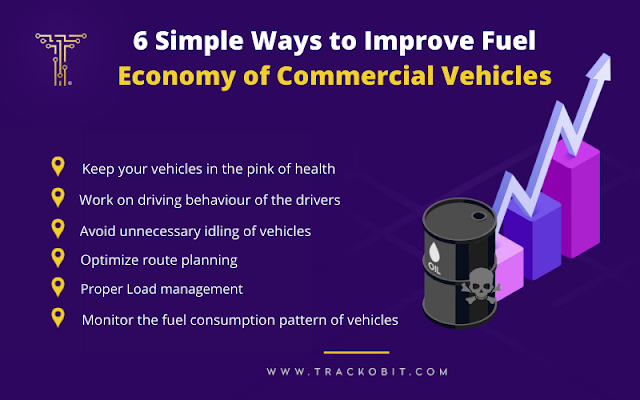 |
| 6 Simple Ways to Improve Fuel Economy of Commercial Vehicles |
Want to improve the performance of your fleet? The simplest yet the most significant way is by enhancing the performance of every vehicle of the fleet. A few blots in the fleet can hamper the economy of the entire fleet.
Here are a few practices that will help you improve the fuel economy of your vehicles.
1. Keep your vehicles in the pink of health
Never miss the service and maintenance date of the vehicles. The deteriorating performance of the vehicle is directly related to the decaying health of the vehicle. As the vehicles are always on the move, it’s imperative to ensure the wellbeing of the engine along with the rest of the parts for better efficiency.
2. Work on driving behaviour of the drivers
The rash driving behaviour deteriorates the fuel economy of the vehicle. It also hampers the overall condition of the vehicle in the long run. Harsh acceleration, sudden brakes, overspeeding, etc. leads to fuel wastage. It is imperative to train the drivers to be mindful while driving.
3. Avoid unnecessary idling of vehicles
Do you know idling for more than 10 seconds burns more fuel and emits more CO2 than stopping and restarting your engine does? With commercial vehicles, it becomes even more significant as the average is very less. Working on idling alone can improve fuel economy by at least 8%.
4. Optimize route planning
Manage multi-stop trips by selecting the most efficient routes. It also helps in maximizing vehicle utilization. You can find the shortest routes, prioritize stops and save on fuel. No wonder, more and more fleet owners are opting for Trip management software these days.
5. Proper Load management
Overloading is the most common ills practice in developing nations. Every vehicle has its optimum load-carrying capacity. If we exceed that, it can put extra stress on the engine, hence impacting fuel economy. Equal load distribution also plays a crucial role in getting the maximum fuel efficiency.
6. Monitor the fuel consumption pattern of vehicles
While you have made sure the above five points are well taken care of, monitoring the performance of vehicles over the period is equally important. To fix the problem, we need to reach the problem first. If the vehicle is not giving the expected averages so where exactly the problem is. Is it in the vehicle or with the driving behaviour? Fleet management software gives you elaborated reports and charts that help you deduce the insights and make informed decisions.
If you follow these six practices religiously, you’ll see fuel consumption dropping significantly in a matter of a few weeks.
Comments
Post a Comment